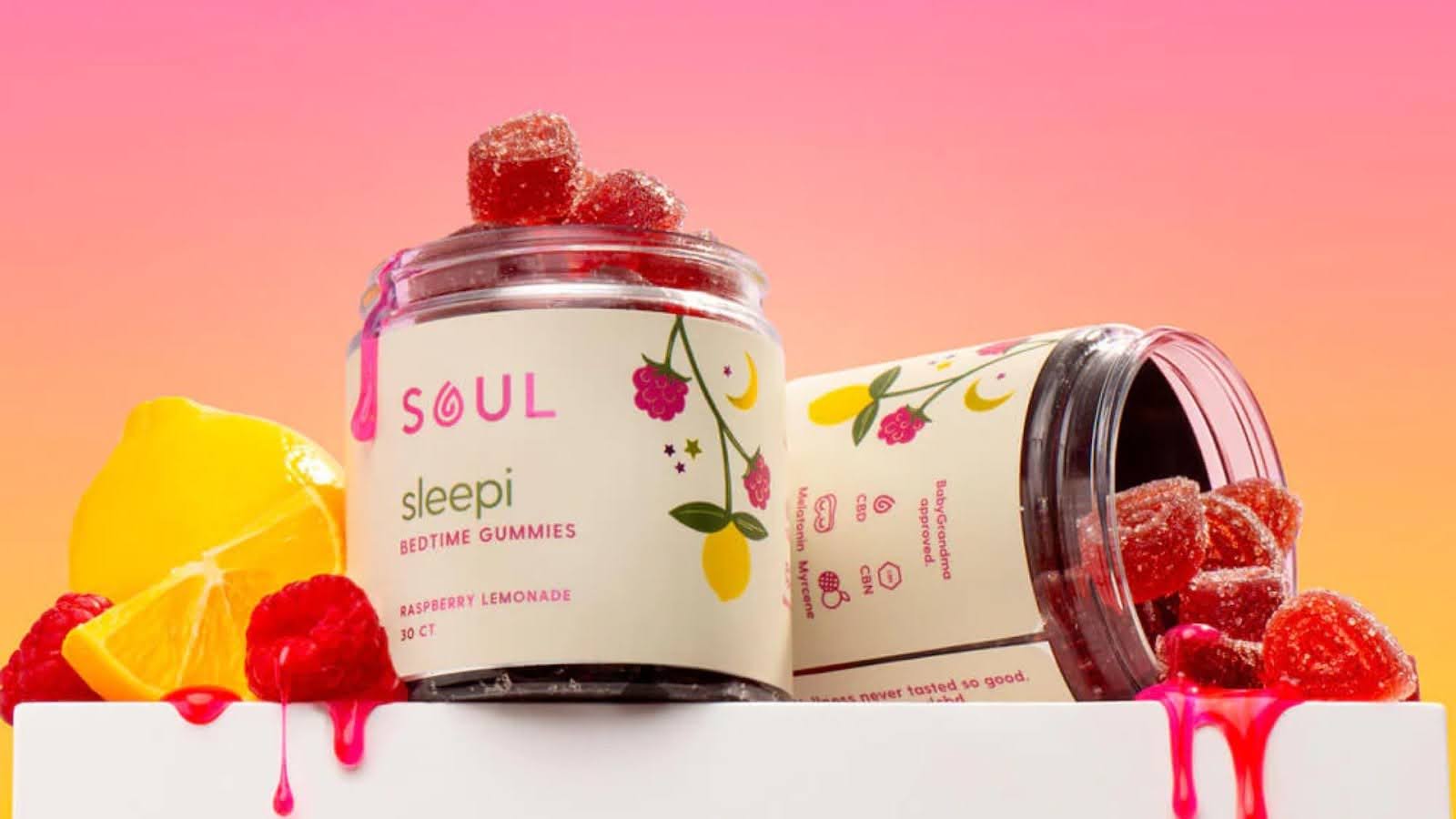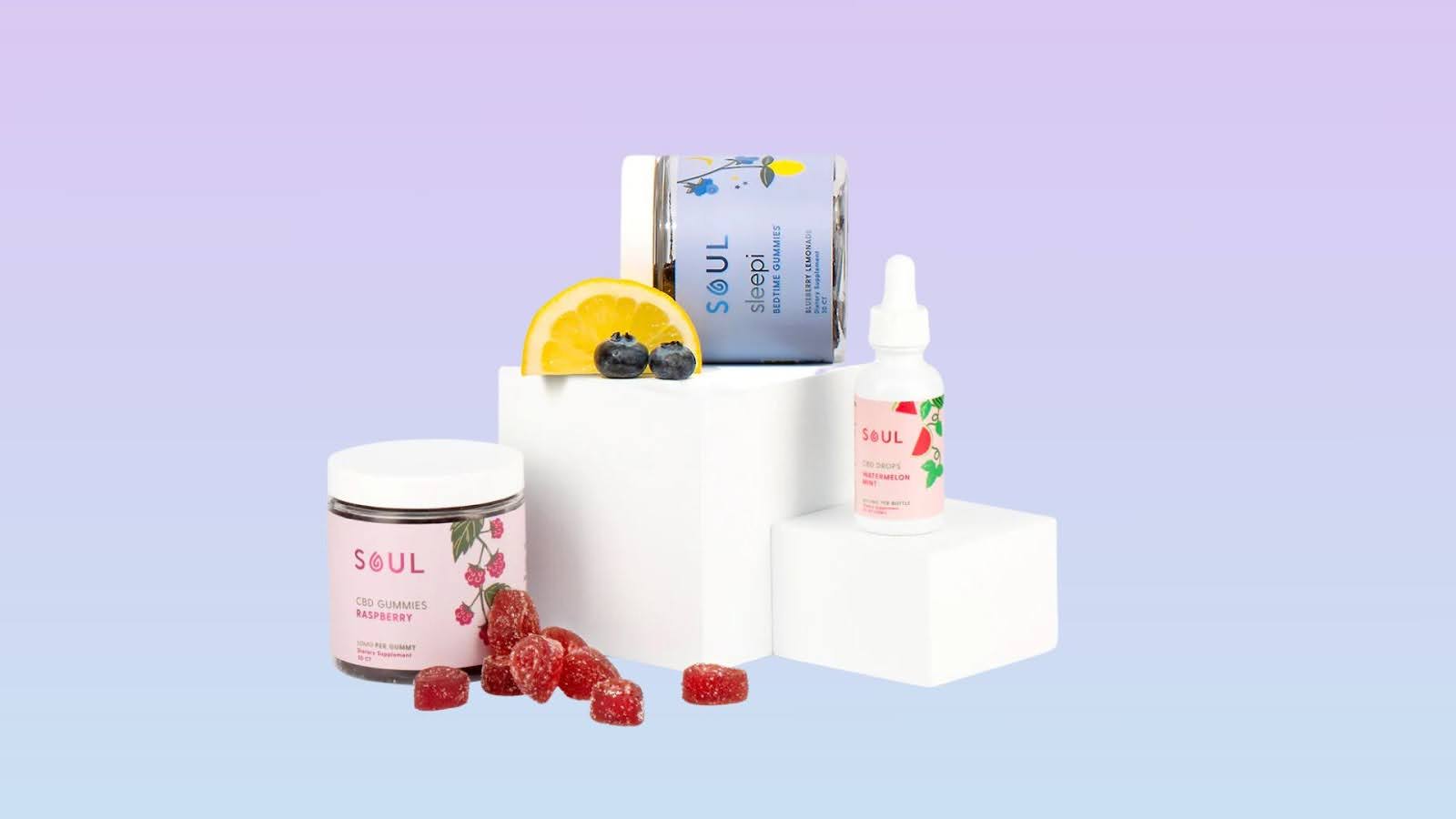Better sleep is in right now, but while most people are showing a greater interest in their sleep hygiene, few know what to turn to in order to experience higher-quality sleep. One of the most common recommendations for those struggling with their nightly routine is to take melatonin. But melatonin might not work for everyone. There are many alternatives I recommend looking into that could support your sleep goals, including tetrahydrocannabinol (THC).
If you’re interested in the potential of various compounds for better sleep, I’ll help you better understand what melatonin is, why you might wish to consider something else, and which alternatives (like THC) are a good fit. Ready to see how hemp can support your sleep? Shop our wide selection of products including our newest Vacay THC Gummies, or take our quiz to discover your perfect personalized wellness routine today!
What Is Melatonin?
Melatonin is a naturally occurring hormone in the human body that’s primarily produced by the pineal gland, a small gland located in the brain. It plays a vital role in regulating our sleep-wake cycle, also known as the circadian rhythm. This hormone is often referred to as the "sleep hormone" because it helps control when we feel awake and when we feel sleepy. The production of melatonin is influenced by external factors, such as light and darkness, which signal our body when it's time to sleep or wake up.1
Why Is Melatonin Important?
Melatonin is essential for maintaining a healthy sleep pattern and overall well-being. It serves as a biological timekeeper, helping our body align with the natural day-night cycle. Melatonin levels rise in the evening as the sun sets, signaling to our body that it's time to wind down and prepare for restorative sleep. Without adequate melatonin production, our sleep can be disrupted, leading to insomnia, difficulty falling asleep, and poor sleep quality. Additionally, melatonin has antioxidant properties that can help protect our cells from damage and support various aspects of our health.2
Discover A Better Way To Unwind With Soul!Experience the Soul difference today and discover:
Explore our wide range of delicious CBD-infused products (and general wellness products), each expertly crafted to cater to your specific wellness needs. We're more than just a brand; we're your partner in achieving the state of well-being that you've always aspired to. Experience the difference with Soul and start living your best life today! |
How Does Melatonin Work?
Melatonin's primary function is to regulate our sleep-wake cycle by interacting with the body's internal clock, known as the suprachiasmatic nucleus (SCN). This tiny region in the brain receives signals from our eyes regarding light exposure. When darkness falls, the SCN sends a signal to the pineal gland to increase melatonin production, making us feel drowsy and promoting sleep. Conversely, when we are exposed to light, especially blue light from screens, melatonin production is suppressed, keeping us awake.3 The interaction between light exposure, melatonin production, and the SCN ensures our body's synchronization with the day-night cycle.
Benefits Of Melatonin Alternatives
When exploring melatonin, it's essential to consider the potential benefits of melatonin alternatives as melatonin, while popular, is not the only or most effective solution for the sleep-related issues you’re experiencing. Here are some advantages of opting for alternative sleep aids:
Natural And Herbal Options
Many melatonin alternatives are derived from natural sources, such as plants and herbs, aligning with a natural, wellness-focused lifestyle. If you’re interested in what mother nature has to offer, try more than just melatonin to see how these different natural compounds support your sleep.
Personalization
With a variety of alternatives available, individuals can choose the one that best suits their preferences and needs, allowing for a more personalized approach to sleep improvement. You may even find products that combine multiple compounds for greater support and efficacy, such as our Vacay THC Gummies! Try these new relaxing gummies for yourself to see how they fit into your routine.
Holistic Wellness
Melatonin alternatives often align with the principles of holistic wellness, addressing sleep issues while considering overall health and well-being. If you’re looking to address issues that contribute to poor sleep and avoid only targeting a lack of tiredness, consider more holistic solutions.
What Are The Alternatives To Melatonin?
While melatonin is a popular sleep aid, it's not the only option available. Here are some alternatives to consider:
THC
THC, the psychoactive compound found in cannabis, has shown promise as an effective sleep aid when used in moderation. Its relaxing properties may help promote a deeper and more restful sleep.
CBD
Cannabidiol (CBD) is another compound found in cannabis but without the psychoactive effects of THC. CBD may help regulate sleep patterns and promote better sleep quality, giving you the extra support you need without the side effects that accompany traditional sleep medications.

Valerian Root
Valerian root is an herbal remedy that has been used for centuries to improve sleep. It may help to reduce insomnia and promote a sense of calmness so that you can relax before bedtime, regardless of whether you take it in capsule form or add it to a tea mix.
L-Theanine
L-theanine is an amino acid commonly found in green tea. It may help reduce anxiety and promote relaxation, leading to better sleep.
Finding Your Ideal Sleep Aid
Discovering your ideal sleep aid involves a bit of trial and error. What works best for one person may not work for another. To find your perfect sleep aid, consider the following:
- Consultation: Seek guidance from a healthcare provider or wellness expert who can tailor recommendations to your unique needs, preferences, and any underlying health conditions.
- Trial and Error: Don't hesitate to experiment with different alternatives and dosage levels until you pinpoint what works optimally for your sleep goals. Keep a sleep journal to track your progress and identify patterns.
- Consistency: Establishing a consistent sleep routine is vital for maximizing the efficacy of your chosen sleep aid. Consistency allows your body to adapt to the sleep-promoting effects gradually.

Legal Considerations Of THC Use
It’s important to understand that the legality of THC is quite complex. Federally, delta-9 THC (the main component of cannabis) is illegal. However, many states have their own laws allowing for the medical or recreational use of marijuana. More broadly, alternative sources of THC like THC from hemp tend to have fewer regulations, making delta-8, delta-9, delta-10, and other forms of THC more available and less restricted than its traditional counterpart. Make sure to do your research to better understand what’s legal in your state or city, and keep up with developing regulations to make sure that you’re always in compliance.
Final Thoughts On Melatonin Alternatives
Exploring melatonin alternatives is an important topic in the realm of wellness. By discussing these alternatives, we acknowledge the diverse sleep needs and preferences of individuals while empowering them to make informed choices for their sleep health. Whether it's THC, CBD, herbal supplements, or other alternatives, the shared goal is to enhance sleep naturally and effectively.
If you’re ready to try THC and other hemp derivatives for better sleep, I highly recommend getting started with Soul! At Soul, we strive to deliver premium hemp products while educating consumers on the potential benefits of CBD from a recreational standpoint. We understand the importance of finding the right sleep aid that suits your unique needs. That's why we offer a range of high-quality CBD products that can be explored as potential melatonin alternatives. Whether you’re looking to get started with our Vacay THC Gummies or something else, we’re here to help!
Read More:
- Non-Habit Forming Sleep Aids: Natural Solutions To Sleep Disorders
- Effective And Safe Natural Sleep Remedies: Your Ticket To A Restful Night
- Sleep Science 101: Understanding The Science Behind Better Sleep
Frequently Asked Questions About Melatonin Alternatives
What's the difference between THC and CBD in terms of sleep aid effectiveness?
THC and CBD have distinct effects on sleep. While THC may have sedative properties and is associated with the "high" of cannabis, CBD is non-psychoactive and is believed to promote relaxation and potentially aid sleep without the intoxication.
Can I legally purchase THC-based sleep aids without a prescription?
The legality of purchasing THC-based sleep aids without a prescription varies widely from one jurisdiction to another. It's essential to research and adhere to local regulations and consult with a medical professional if necessary.
Is THC suitable for long-term use as a sleep aid?
Prolonged and excessive use of THC may lead to dependence and tolerance. It is essential to use it responsibly and consider alternative solutions for long-term sleep management.
Are there any age restrictions for using THC as a sleep aid?
Many regions have age restrictions for purchasing and using THC products. Take care to ensure you comply with local laws regarding age limitations.
What is the best time to take THC for optimal sleep results?
The ideal time to take THC for improved sleep varies among individuals. Experiment with different timings to determine what works best for you, but generally, taking it shortly before bedtime (30 minutes to an hour before) is common.
Can THC interact with any medications I'm currently taking?
THC has the potential to interact with certain medications. Consult with your healthcare provider to assess potential drug interactions before using THC as a sleep aid.
Is THC the only compound in cannabis that can aid sleep?
THC is not the sole compound in cannabis that may assist with sleep. Other cannabinoids, such as CBN (Cannabinol), and terpenes found in different strains of cannabis may also play a role in promoting sleep.
Are there specific strains of cannabis that are better for sleep?
Indica-dominant strains are often associated with relaxation and sedation, making them potentially suitable choices for sleep aid purposes. However, individual responses to strains may vary.
Can THC be combined with other natural sleep remedies?
Combining THC with other natural sleep remedies, such as valerian root or chamomile tea, may enhance its effectiveness. However, always consult a healthcare professional before attempting any combinations to ensure safety and compatibility.
Are there any potential side effects of using THC as a sleep aid?
Common side effects of THC use may include drowsiness, dry mouth, altered perception, impaired cognitive function, and increased appetite (commonly referred to as "the munchies"). Individual reactions to THC can vary, so it's advisable to start with a low dose to minimize potential adverse effects.
Sources:
- U.S. Department of Health and Human Services. (n.d.). Melatonin: What you need to know. National Center for Complementary and Integrative Health. https://www.nccih.nih.gov/health/melatonin-what-you-need-to-know
- Reiter RJ;Mayo JC;Tan DX;Sainz RM;Alatorre-Jimenez M;Qin L; (n.d.). Melatonin as an antioxidant: Under promises but over delivers. Journal of pineal research. https://pubmed.ncbi.nlm.nih.gov/27500468/
- Blue Light has a dark side. Harvard Health. (2020, July 7). https://www.health.harvard.edu/staying-healthy/blue-light-has-a-dark-side




